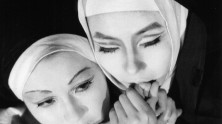
The Deserted Archipelago
(Mujin retto)
With Aoki Kazuko, Arai Jun, Asakawa Ayuko.
Japan, 1969, 35mm, black & white, 56 min.
Japanese with English subtitles.
Print source: HFA
The Deserted Archipelago was my first independently directed and produced film. It won the Grand Prix at the Nyon International Film Festival and garnered considerable attention both overseas and in Japan. The film follows an extremely simple story of a plain boy who matures into manhood while constantly manipulated by nuns. But woven into this narrative are my own experiences and the history of postwar Japan, as well as a series of fantasies. The result is a multifaceted and multilayered objet, the birth of a newly surrealistic filmmaking. On August 15th, the day the war ended, I was in the third year of primary school. That day, when the reality that I had known turned completely upside down, I was saddled with the trauma of no longer being able to believe in anything. Searching here and there for some kind of spiritual salvation, I finally found the existentialism of Albert Camus. From there, I was able to build up my own kind of existentialism, and this film is best understood as based in that “Kanai Katsu Existentialism.” The film was praised by European film scholars Max Tessier and Tony Rayns, and it was screened as part of “Eiga: 25 Years of Japanese Film,” a special program at the 1984 Edinburgh International Film Festival. – KK
PRECEDED BY
-
Holy Theater (Seinaru gekijo)
Directed by Kanai Katsu.
With Jonouchi Motoharu, Osaka Toku, Sato Shigeomi.
Japan, 1998, digital video, color, 29 min.
Japanese with English subtitles.
Copy source: ACC Cinematheque
Holy Theater is a film whose stage is nothing more elaborate than the garden behind my house, and it’s a film that’s still evolving. It’s said that people die twice. The first death is a physical one, and the second, true death comes when there is no one to remember that person. When I screened the first version of Holy Theater (at the Image Forum Festival in 1989), four of the actors from The Kingdom had already entered the demon’s ledger, as they say in China. Each was a dear friend, and each was a uniquely talented individual: Jonouchi Motoharu, a pioneer of Japanese avant-garde film; Osaka Toku, a bartender who truly understood me and who fell from the skies over Sakhalin; Satoh Jyushin, a film critic whose uniquely keen nose meant a constant discovery of new art films; and Yamatoya Atsushi, that grandest of dandies, at once director and screenwriter and actor. I thought I might keep them forever on this earth with Holy Theater. In its Act One, we see performances by some little animals, but since I continue to film their captivating moments of action, I like to call this piece my evolving film. – KK













